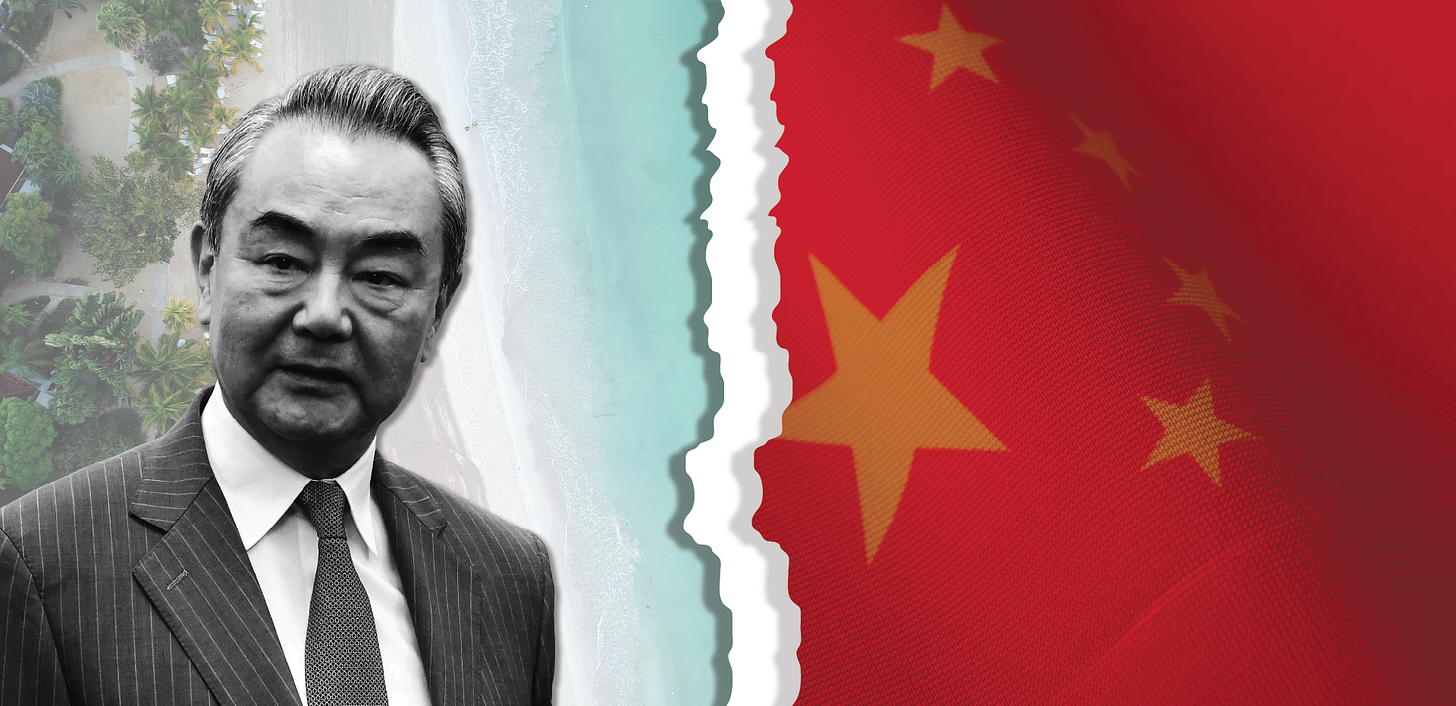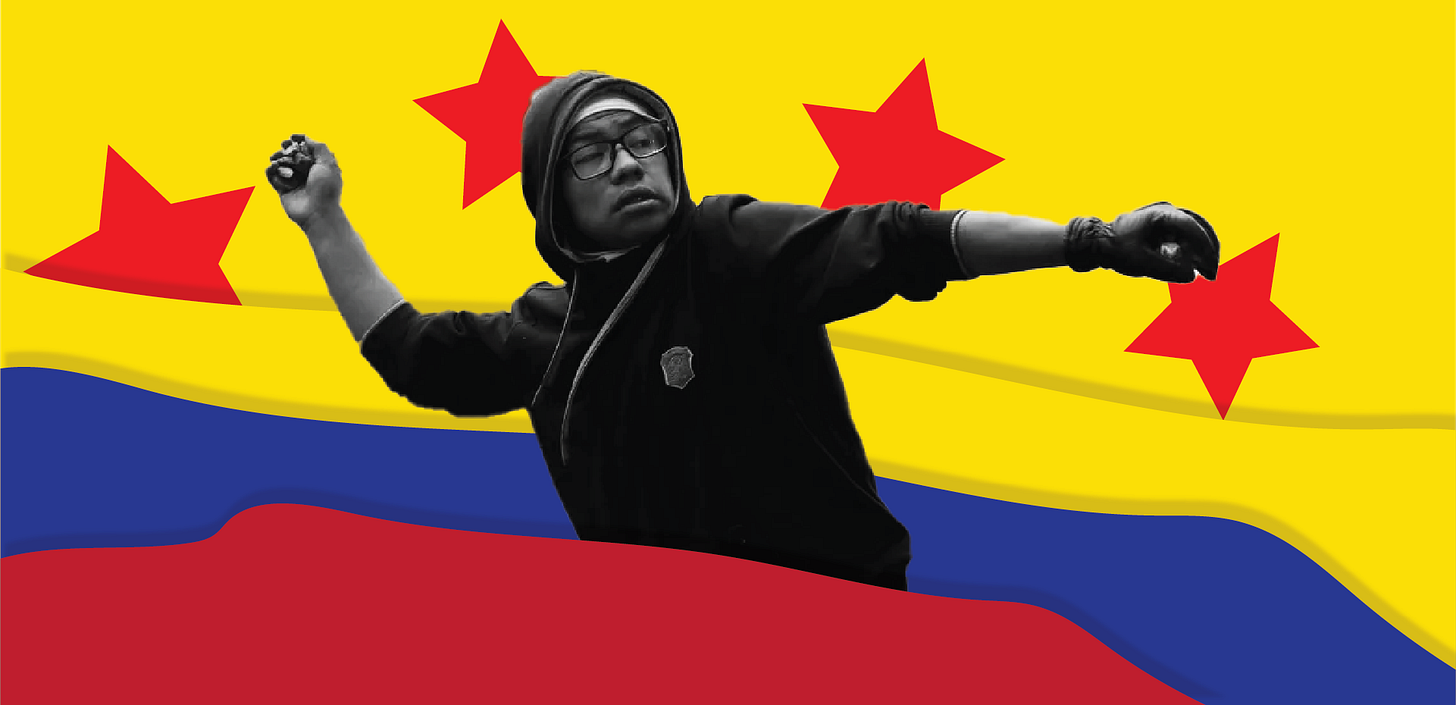Chaufa - A Countering Force
T&T's BRI project opens, Wang Yi heads to Jamaica and Brazil, a meeting in Argentina, and China's comments on Ecuador
Welcome to Chaufa, a China-Western Hemisphere Newsletter by CPSI.
Today’s Edition covers January 8 to January 14.
This Week’s Top 5 Stories:
Trinidad and Tobago commissioned the first Belt and Road Initiative (BRI) project in the Caribbean, the Phoenix Park Industrial Estate, in a ceremony on January 10. Both T&T’s Prime Minister and Beijing’s ambassador praised the project’s economic impact and the future of bilateral relations.
China’s Foreign Minister, Wang Yi, is expected to visit Jamaica and Brazil in the coming weeks to celebrate the 50th anniversary of China-Brazil diplomatic ties and the 5th anniversary of the China-Jamaica Strategic Partnership. (FMPRC) Wang’s visit to Jamaica is expected to focus on economic cooperation, cultural exchange, infrastructure projects, and development assistance.
This appears to be Wang’s first trip to the region since he returned to the foreign minister role this summer. The trip will come on the heels of a visit to four African countries (Egypt, Tunisia, Togo and Cote d'Ivoire).
Argentina’s Foreign Minister Diana Mondino met with China’s Ambassador to Buenos Aires on January 12 to “reaffirm” the country’s commitment to the “One China Principle”, though her statement made no mention of the currency swap nor the BRI, after it was revealed that she met with Taiwan’s delegation to the country in December.
China also announced tariff reductions and extensions on 143 Argentine agricultural and industrial products, including shrimp, corn, and dairy products.
These moves are an attempt to stabilize the relationship after China possibly suspended its currency swap with Argentina and as Milei’s administration decided to both not join the BRICS and to consider purchasing U.S. F-16s over Chinese-made JF-17’s.
Following a spat of unprecedented violence in Ecuador, China temporarily closed its consular services in Quito and Guayaquil (as did the U.S. embassy and consulate) and expressed its “hope that Ecuador will earnestly ensure the safety of Chinese people and institutions.” (FMPRC)
Countries from across the Western Hemisphere congratulated William Lai on winning Taiwan’s presidential election, including Belize, Canada, Guatemala, Haiti, Paraguay, Saint Lucia, Saint Kitts, Saint Vincent and the Grenadines, and the United States.
My Take
Ecuador and the limits of China’s presence
Despite China’s expanding ties across Latin America and the Caribbean, Washington’s and Beijing’s responses to the crisis in Ecuador show the limits of Beijing’s regional ambitions and influence.
China-Ecuador economic ties are incredibly close: in 2021, China imported roughly 15% ($4 billion) of Ecuador’s exports, and a new FTA will only likely further expand these trade ties. Ecuador is also highly reliant on China for investment and financing – per the Inter-American Dialogue, the Andean country is the third-highest recipient of the PRC policy banks’ regional loans, and the country owes 11% of its external debt ($5 billion) to Beijing.
Moreover, Ecuador is a comprehensive strategic partner with the PRC, the highest level of partnership in China’s diplomatic rankings.1 Ecuador also famously bought much of its security equipment from China and is one of the LAC countries that conducted bilateral police diplomacy meetings with China’s Ministry of Public Security.
And yet, despite these rapidly growing ties, it was the United States, not China, that President Noboa’s administration turned to in its time of crisis. In the days following the horrific attacks in Guayaquil and across the Andes, it was Washington, not Beijing, that pledged an acceleration of security assistance and senior-level visits to demonstrate commitment to Ecuador’s peace and security.
In contrast to the Biden Administration, China’s response was a bland press conference answer expressing support for “the government of Ecuador in maintaining social stability and hopes that the country will restore order as soon as possible.”
The contrasting willingness of the United States and China to uphold regional security and democracy is not unique to this situation in Ecuador. For example, when Bolsonaro threatened Brazil’s democracy, it was the United States, not China, that rallied support for a (relatively) smooth presidential transition. China similarly avoided making any commitments or staking a position on Venezuela’s recent aggression against Guyana even though a Chinese oil investment would have been impacted. And outside the region, we’re seeing this play out in the Red Sea crisis, where it is the United States and its partners, not China, is acting to re-establish the free flow of goods through a critical maritime passage.
The difference between Washington’s and Beijing’s responses should highlight that despite the frequent worries that China is displacing the United States in its backyard, when push comes to shove Washington is often both a preferred partner2 and the country actually willing to provide real resources to its LAC friends in a crisis.
The Roundup
Politics and Society
Suriname’s foreign minister hinted both that President Santokhi might travel to China sometime before June and that debt rescheduling negotiations might be completed within the next month.
Vice Chairman of the National Committee of the Chinese People's Political Consultative Conference (CPPCC) met with Cuba’s Ambassador to Beijing to discuss cultural and government exchanges. (Xinhua)
Canada’s and China’s foreign ministers held a call this week to reduce bilateral tensions, with Canadian FM Joly suggesting the two sides collaborate on “fighting climate change and deepening economic and people-to-people ties.”
Diplomats from the Nicaraguan embassy met with lawyers from the Chinese government-backed Belt and Road Initiative Services Connections law firm to discuss establishing an office in the Central American country. (El 19 Digital)
The Mayor of Buenos Aires met with China’s ambassador to Argentina to environmental and energy collaboration, cultural exchanges, and tourism.
Investment, infrastructure, and finance
Zijin Mining Group plans to purchase a 15% stake in Canadian mining firm Solaris Resource for about $100 million, which will allow Solaris to further its Warintza Project in southeastern Ecuador.
China International Water & Electric joined three other firms (Rialma from Brazil; Lindsayca CH4 Guyana from Panama; and OEC, GE Vernova and Worley from Brazil, the United States, and Australia respectively) pre-qualified to bid on the 165MW Amaila Falls hydro project in Guyana, while CNOOC Petroleum Guyana Limited donated a $150,000 addition to a local primary school.
Chinese construction firm CRRC expressed interest in bidding for 214 km of highway projects in Brazil, both on the São Paulo coast and the stretch of BR-040 between Minas Gerais and Rio de Janeiro, while business and media leaders, as well as the Governor of Acre, met in China for the Brazil-China Economic Forum (Shenzhen) to mark the 50th anniversary of relations. (China.org)
Honduran and Chinese officials presented a new PRC International Development Cooperation Agency project to improve the infrastructure of 1,200 schools across the country. (Xinhua)
Trade and Technology
The Ecuadorian National Assembly suspended debate on its China FTA after some deputies complained that they did not have enough time to renew the document, while still others worried about the FTA’s effects on the economy and environment.
China is officially set to be the second largest exporter to the United States for the first time in 17 years, with Mexico exporting roughly $46 billion more in 2023. (El Pais)
Roughly 30 Chinese companies looking to start or expand their presence in El Salvador, including Harzone Industry Corp and Huawei, participated in a commercial exhibition organized by the Chinese Council for the Promotion of International Trade in San Salvador. (Prensa Latina)
Argentina’s Minister of Agriculture Development signed an MOU with the Agriculture University of China to improve the development of agricultural machinery, genetic improvements, and education and training.
Peru’s Ministry of Agriculture plans to advocate for the country to be able to export pomegranate as well as frozen blueberries, mangoes, and avocado, while Bolivia hopes to gain access to China for beef offal and sorghum.
Taiwan
Taiwanese foreign minister Joseph Wu attended Guatemala’s presidential inauguration on Sunday and met with incoming President Arevalo to discuss expanding trade.
Roughly two years after breaking off relations, the Ortega regime ordered the closure of four Taiwan-related civil society organizations, including the Taiwanese Chamber of Commerce in Nicaragua and the Taiwanese-Nicaraguan Business Chamber. (RFI)
The Taiwan-Central American Bank for Economic Integration (CABEI) trust fund issued a $400,000 technical assistance grant to Belize for sustainable tourism.
Taiwan’s Vice Minister of Foreign Affairs Remus Chen attended an event at Haiti’s embassy celebrating the Caribbean country’s 220th year of independence.
Venezuela’s government reaffirmed its commitment to the One China Principle in a statement after Taiwan’s presidential election.
Analysis and Opinion
Writing for the Americas Quarterly, Ryan Berg and Leland Lazarus argue that Washington and Taipei should “pool resources to fund the large-scale infrastructure projects Guatemala needs” to prevent the Arevalo administration from recognizing China.
Dialogo Chino looked at the possibilities for China-LAC relations in 2024, suggesting that “agriculture, mining, and energy will remain central… while new avenues for cooperation around conservation may open up.”
Carlo Caro wrote in The Diplomat about Argentina’s uncomfortable position finding neutrality between the United States and China in the context of the PLA’s space station in Patagonia.
That’s it for now! See you next week.
Make sure you don’t miss the next issue of Chaufa 👇
The ranking situation is a bit more complicated than this — for example, Cuba, one of the PRC’s few Communist comrades, holds the “Good Brother, Good Comrade, Good Friend” label that doesn’t exactly match up with the usual rankings. But it seems that for most countries, achieving a “comprehensive strategic partnership” indicates reaching the pinnacle of the relationship hierarchy.
Of course, much of this was likely contingent on the administration in power — if the Correistas had won the past election, Ecuador might have been significantly less willing to receive U.S. assistance.









